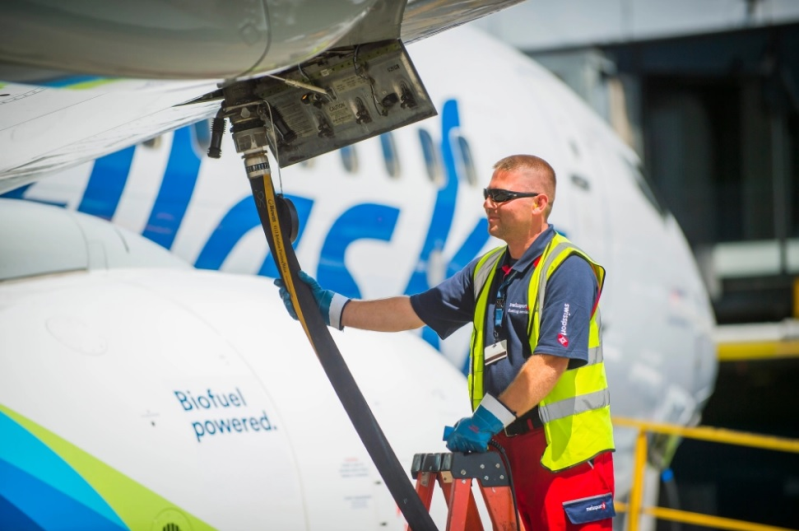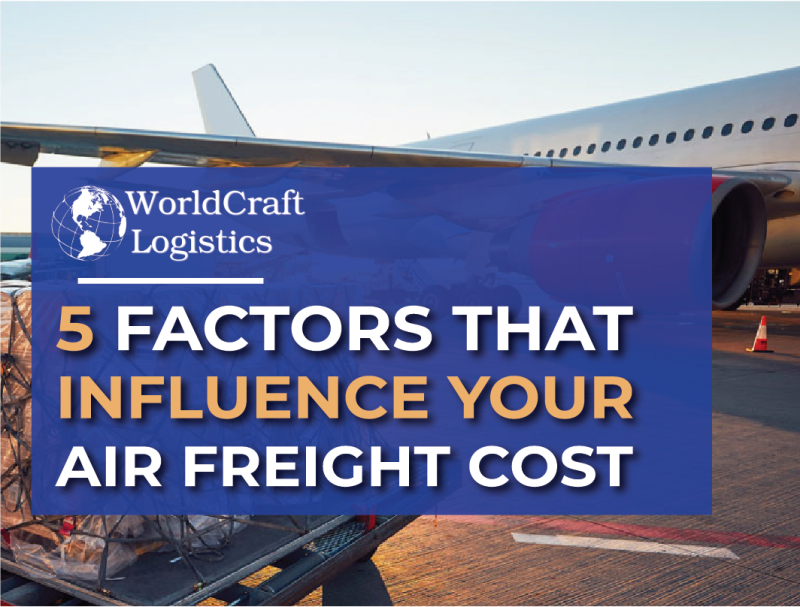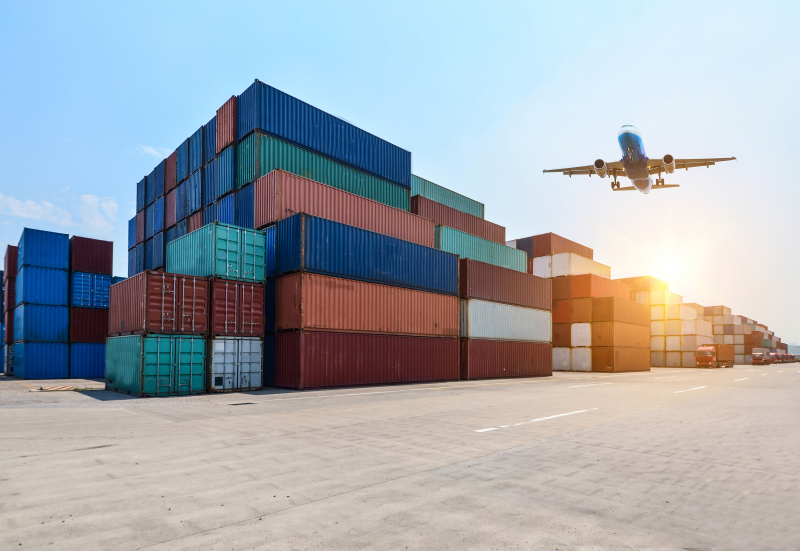Although the distinction between air freight vs sea freight might seem obvious, importers and exporters should take the time to fully comprehend it. The pros and downsides of each route are highlighted in the following Worldcraft Logistics guide to shipping products by air or sea, allowing you to make the best decision for your shipment.

The main difference between Air Freight vs Sea Freight
Continuous study is necessary to choose the best route of transportation for your freight. Your supply chain demands will need to be reviewed frequently to maintain its effectiveness and cost-effectiveness.
Regardless of the method you select, partnering with a provider who provides a comprehensive array of worldwide logistics and technology services will assist guarantee the way you want is accessible when you need it most.
When deciding whether air freight or ocean shipping is the best choice to meet your current transportation demands, be sure to take the following factors into account.
1. Cost depends on the parameters of the freight
Although it may appear that ocean shipping is usually less expensive than air freight, you must first comprehend how each is charged.
Chargeable weight, a statistic created by combining the weight and size of the package, is used to compute air freight billing. Weight of the shipment is typically not taken into account in ocean shipping. Instead, ocean transportation is billed by container, with a set rate for a complete standard container (20' x 40'). Billing for LCLs is done on a cubic meter basis.
Shipping via sea is frequently significantly less expensive for large, heavy shipments. However, the difference between air and ocean prices also narrows as shipment volumes grow smaller.
But the price of transportation itself is just the start. Calculating inventory expenses is also necessary. The cost of warehousing for ocean shipments is typically higher than the cost for warehousing at airports. Learn more specifically through our article 5 Factors That Influence Your Air Freight Cost.
Keep in mind that when shipping internationally, both modes of transportation will be subject to destination taxes and customs duties.
2. Varying drastically depending on the mode

Shipping via air is far quicker than via sea. Deliveries made via ocean might occasionally take weeks. A day or two is all it takes for air freight to get there. The speed of air freight cannot be matched, despite the fact that ships are becoming quicker and ocean transport routes are continually improved.
The demand for quicker delivery times is growing across many industries, but before sending anything by air right away, carefully map out your shipping strategy. It will save costs and produce long-term efficiencies.
3. It is possible to attain reliability using both strategies

Schedule changes are often handled more skillfully by airlines than by ocean carriers. Although factors like weather can significantly alter airline timetables, flights often get rescheduled and altered promptly and effectively. Additionally, whereas ships typically depart once a week, there are typically several flights each day between large cities.
Despite this, air freight is not always more dependable than maritime freight. Ships frequently require a few days to resume normal operations after being thrown off schedule. Even for some time-sensitive freight like perishables, clothing, and auto parts, however, ocean shipping can become a desirable choice because to ongoing alliances amongst ocean carriers that can increase reliability and integrity for ocean transportation.
4. Service could be impacted by ocean alliance complexity
Although partnerships between ocean carriers boost reliability, they can also lead to issues. For instance, if three ocean carriers collaborate, you can have a ship from one carrier one week and a different carrier the following week. The permitted commodities are governed by a unique set of regulations for each carrier. Therefore, even if you ship the same goods on the same vessel every week, there is a chance that your product could be rejected if a different carrier is in charge because the rules have changed.
Restrictions on Air Freight for Hazardous Goods

There is a lengthy list of things that are not permitted for air freight, and it varies according to country legislation and airline policies. These forbidden objects consist of the following, with less obvious instances in brackets:
Gasses (such as light bulbs)
Any flammable substances, including perfume
Items that are toxic or corrosive (like batteries)
Items with magnets, like speakers
Risks to public health, such as untanned hides
Oxidizers and biological goods (such as pharmaceuticals)
Something whose package bears a warning symbol.
You should carefully discuss the nature of your cargo with your freight forwarder if you are thinking about shipping it by air. Remember to include supplementary elements like handles as well.
Restrictions may also apply to packaging. For instance, corrugated fiberboard boxes are subject to a maximum weight limit.
Air Shipping vs Sea Shipping Transit Time
s
Smaller shipments (LCL) that don't fill an entire container (FCL) used to routinely take a lot longer to transport than FCL shipments. Shippers who needed lesser amounts relatively quickly had to pay more to ship by air freight.
However, there are currently ocean LCL services that are far less expensive and can compete with air freight for time. This is a result of a number of factors, including quicker ships, upgraded canals that reduce delays on particular routes, advancements in ocean tracking, and a much more competitive freight market.
Presently, some forwarders offer speedy ocean services, also known as expedited LCL, with guaranteed arrival dates, which are actually quicker than FCL and nearly on par with air transit times. Although most air freight is usually consolidated, dedicated services are normally offered just once or twice a week and take time to put together. The average transit time is therefore 5-7 days. This and certain express LCL shipments should be compared. For instance, it can take as little as 8 days to travel from Europe to the East Coast, but it's vital to remember that under the current circumstances, it may take much longer.
What now, air or ocean freight? These services are appropriate for high-value products with a crucial but delayed due date. Additionally, it is effective for goods with a limited shelf life, but longer than a couple of weeks.
Should you ship your goods by sea or by air?

Usually, speed of delivery is the main factor in choosing air service. When opposed to ocean service, moving your freight by air enables a condensed schedule. This is especially beneficial for transporting products with limited shelf lives. Faster service comes with increased transportation expenses, though. You must decide what is appropriate for your shipping plan.
Which should you select, then? Consider your budget, the deadline for delivery of your goods, and the impact that each mode will have on your company's most pressing requirements.
If your budget enables it and your shipments have a strict, imminent arrival deadline, ship via air. Ship via ocean if your arrival date is more flexible or you wish to save money.
>>> Article you may be interested in: A Guide to Shipping Large Items: Tips and Best Practices
Air Freight vs. Ocean Freight FAQ
1. Why does air freight cost so much?
Due to the higher cost of fuel, the expense of recruiting specialist employees, as well as other infrastructural costs related to air cargo delivery, air freight is typically more expensive than maritime freight.
2. Is air freight more affordable than sea freight?
Yes, due to its greater capacity and the fact that it uses fewer resources for transportation, ocean freight is typically less expensive than air cargo.

In the above article, Worldcraft Logistics has made a comparison between Air Freight vs. Ocean Freight. Hope this knowledge is useful to you, helping you choose the type of freight that suits your needs. Currently, Worldcraft Logistics is a reputable freight forwarding unit in the US with more than 10 years of experience, ensuring service quality and goods arriving absolutely safely. If you are looking for a good shipping unit, CONTACT US NOW.
- ADD: 1861 Mountain View Ave, Loma Linda, CA 92354
- TEL: (909) 632-1643
- FAX: (909) 632-1208




